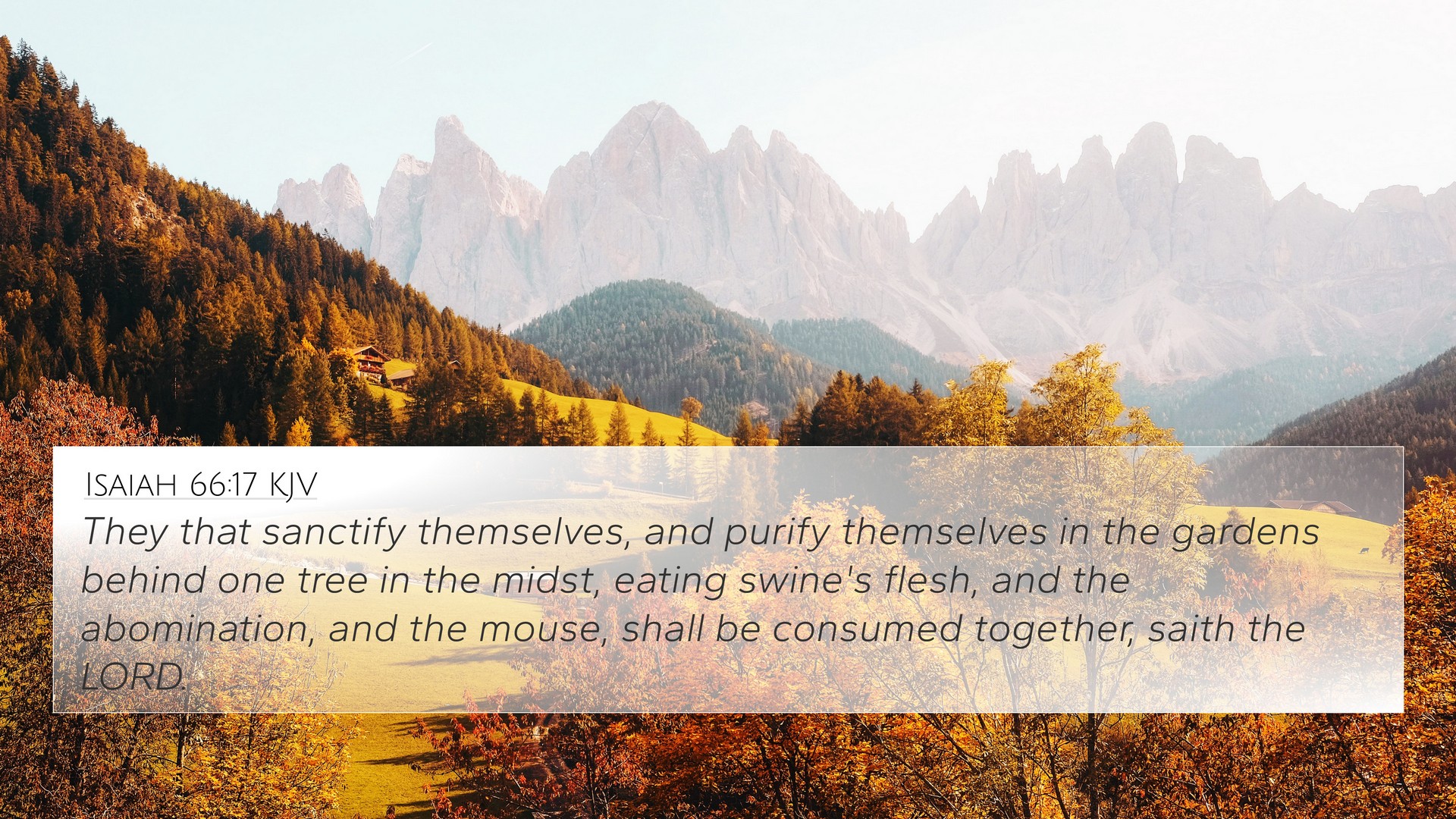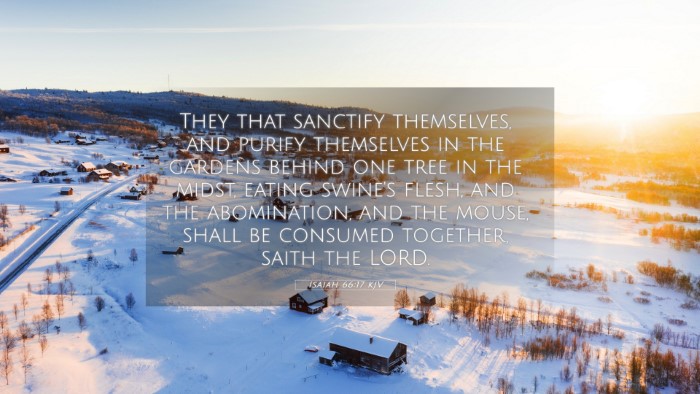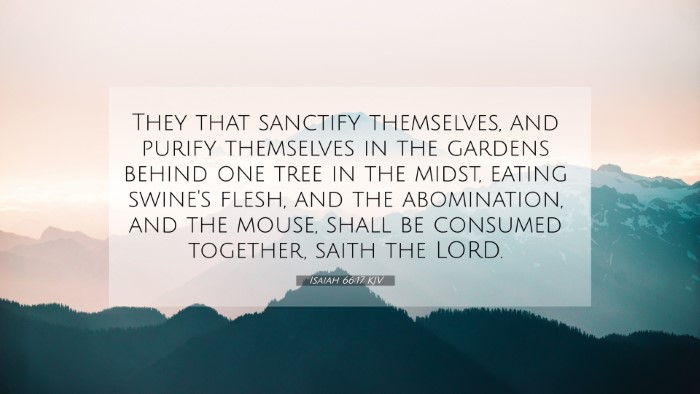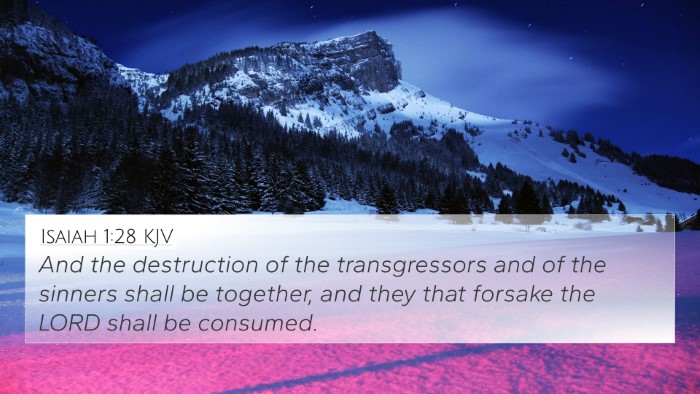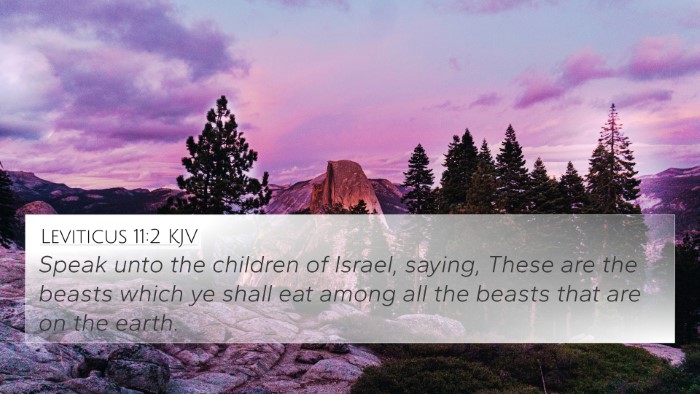Understanding Isaiah 66:17
Verse: Isaiah 66:17 - "Those who sanctify and purify themselves to go to the gardens, following one in the midst, eating pig's flesh and the abomination and mice, shall come to an end together, declares the LORD."
Meaning and Interpretation
This verse presents a stark warning from God against the practices of those who claim to worship Him while indulging in acts that are contrary to His commands. The act of sanctifying and purifying oneself appears hypocritical when the individual engages in detestable acts such as eating unclean animals, which symbolizes rebellion against God's laws.
Commentary Insights
-
Matthew Henry:
Henry notes that this verse highlights the futility of ritualistic purity when it is marred by sinful practices. He emphasizes the importance of true holiness over mere ceremonial observances. The mention of “gardens” can be interpreted as places of idolatrous worship, indicating that these actions are not mere mistakes but deliberate choices to oppress God’s laws.
-
Albert Barnes:
Barnes comments on the contrast between the profanation symbolized by pig's flesh and the aspiration for holiness. He regards the passage as a call to genuine devotion, warning that those who partake in such impure practices will not escape judgment. He links this to broader themes throughout Scripture concerning purity and devotion, highlighting the significance of adhering to God's commandments.
-
Adam Clarke:
Clarke emphasizes the metaphorical significance of the “gardens” and the choices of foods identified in the verse. He interprets this as a critique of those who embark on syncretic worship, blending pagan practices with their faith life. Their ultimate judgment accentuates God's intolerance for such duality in worship.
Cross-References
Isaiah 66:17 connects with various biblical themes and demonstrates the importance of understanding inter-Biblical dialogue. Here are 10 related Bible verses that enhance our understanding of this passage:
- Leviticus 11:7-8: Discusses the unclean animals, highlighting the importance of dietary laws.
- Deuteronomy 14:8: Further reinforces the prohibition against consuming swine, linking back to God's commandments.
- Isaiah 65:4: Points to similar themes of mixing sacred with profane, where God rebukes those engaging in abominable practices.
- Ezekiel 22:26: Explores Israel's disregard for the holiness of God's commands.
- Matthew 15:11: Jesus teaches that defilement comes from within, contrasting ritual purity with inner purity.
- Romans 1:25: Connects to themes of idolatry and turning away from the truth of God.
- 2 Corinthians 6:17: Calls His people to separate from unclean things, resonating with the call to holiness.
- James 1:27: Highlights the essence of true religion involving purity and applying God’s Word to one’s life.
- Revelation 21:8: Speaks of judgment against the unholy, reinforcing the consequences laid out in Isaiah.
- Hebrews 12:14: Encourages believers to pursue holiness, emphasizing the necessity of living a life dedicated to God.
Thematic Connections
Isaiah 66:17 is a pivotal verse in understanding the overall message of purity and holiness in the believer's life. The thematic connections identified through the cross-references highlight a recurrent biblical principle: the expectation of holiness from God’s people. This aligns with a broader understanding found across both testaments, emphasizing adherence to God's commands as essential to genuine worship.
Conclusion
The insights from various commentaries illustrate the depth of Isaiah 66:17 while the cross-references underline significant thematic elements within Scripture, including the call to holiness, the dangers of syncretism, and the consequences of disobedience. In reflecting upon this verse, believers are reminded of the crucial importance of aligning their lives with the tenets of faith as prescribed in the Scriptures.
Tools for Further Study
For those interested in a deeper exploration of biblical connections, consider the following resources:
- Utilizing a Bible concordance to locate pertinent cross-references.
- Engaging in a cross-reference Bible study to explore themes across different books of the Bible.
- Employing a Bible cross-reference guide to aid in understanding complex interrelations of scripture.
- Exploring comprehensive Bible cross-reference materials for an extensive study.
By employing these resources, individuals can enhance their understanding of biblical texts and deepen their engagement with the Word of God.
